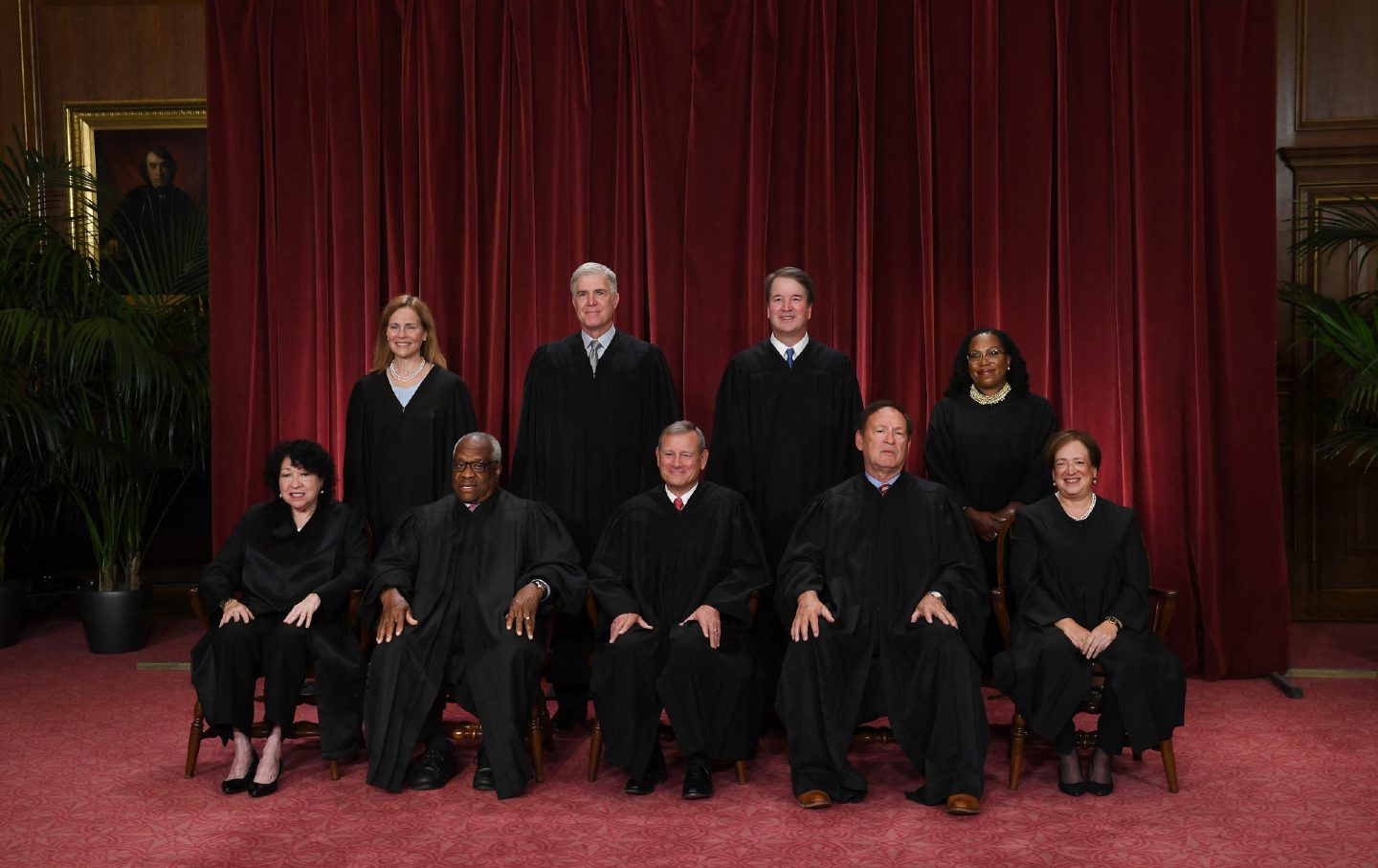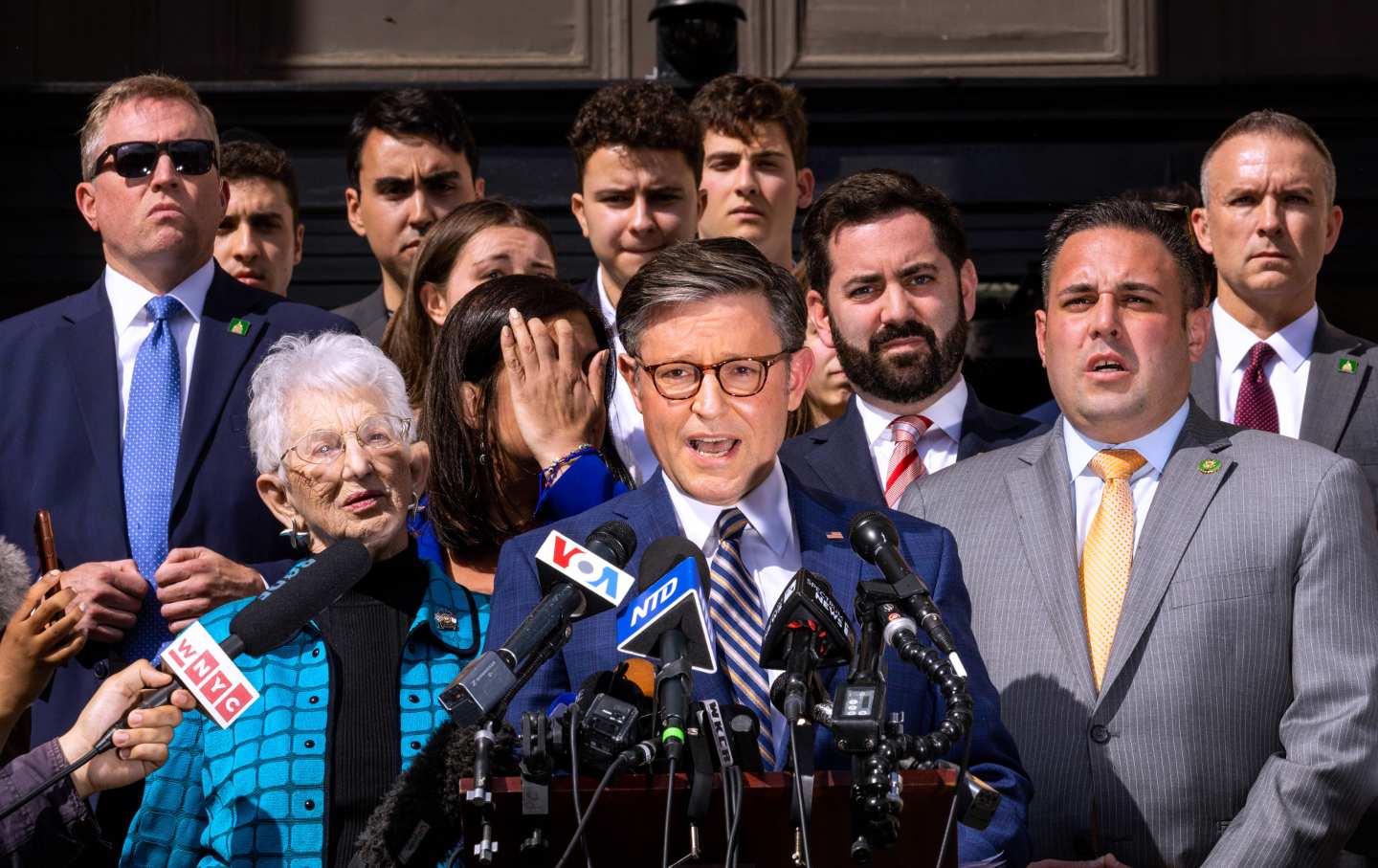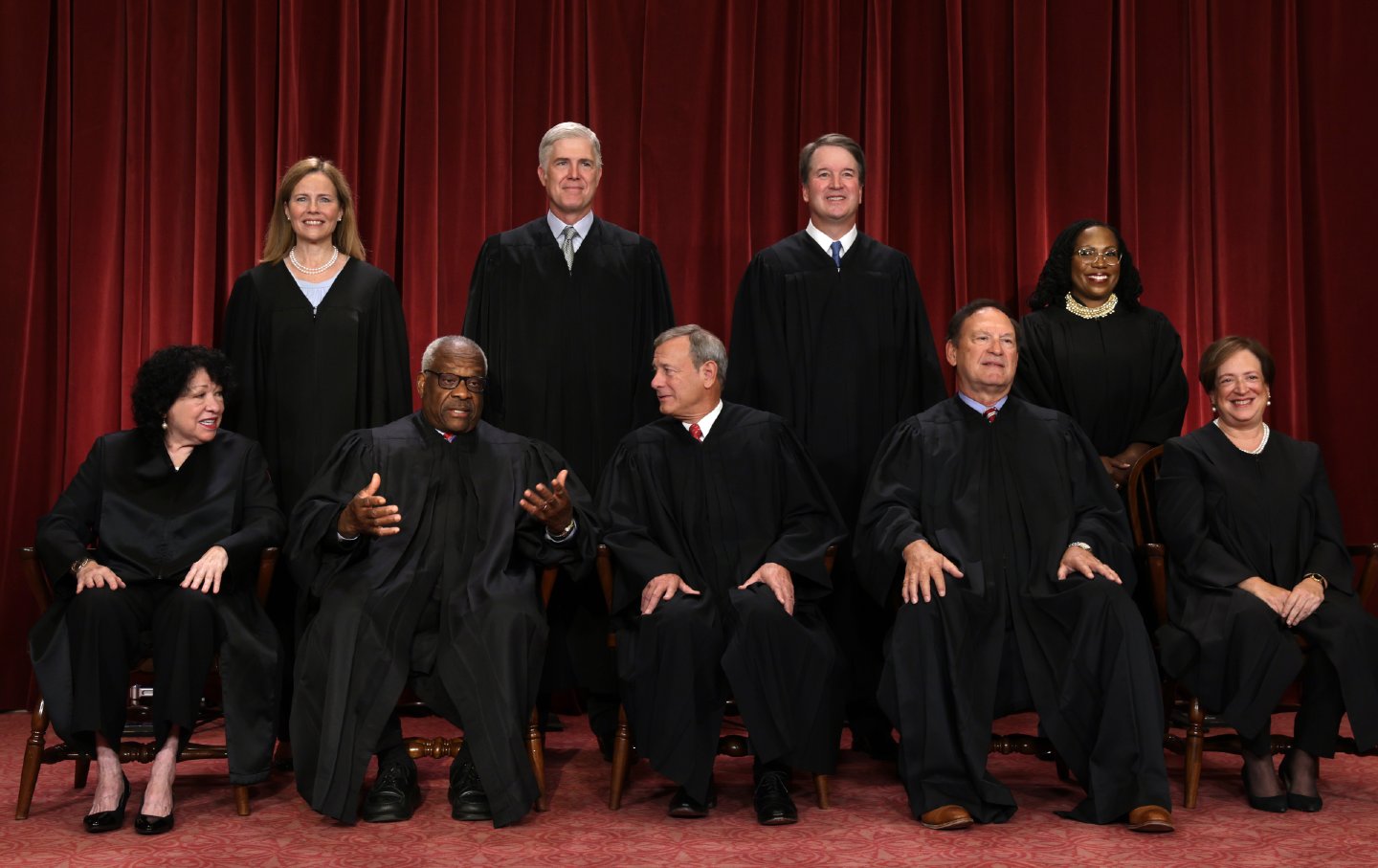Samuel Alito Can’t Tell the Difference Between Sex Discrimination and Peanut Butter
A unanimous Supreme Court ruling on sex discrimination hides serious ideological differences, beginning with Alito’s long-standing hostility to women’s rights.

US Supreme Court Associate Justice Samuel Alito
(Chip Somodevilla / Getty Images)On Wednesday, the Supreme Court announced a tidy unanimous opinion in a sex discrimination case. Saint Louis Police Sergeant Jatonya Muldrow was an investigator in STLPD’s intelligence division. She was forcibly transferred out of the division when a new captain deemed the work was too “dangerous” for a woman. She sued the STLPD for sex discrimination, but her lawsuit was thrown out by a lower court. The Supreme Court reinstated her lawsuit.
The reason this was a Supreme Court case at all was because the police department claimed Muldrow suffered no harm. Muldrow was transferred, but she kept the same salary, rank, and benefits. Muldrow argued that she lost perks, her schedule changed, and the prestige of her new job (in a neighborhood patrol division) didn’t match her old one. Lower courts agreed with the police department and said that people like Muldrow have to show “significant” harm in order to bring sex discrimination suits.
The Supreme Court unanimously agreed that Muldrow showed enough harm to bring a lawsuit—hence their decision to reinstate it—but the justices disagreed on how much harm needed to be shown by future plaintiffs alleging discrimination. Writing for the majority, Justice Elena Kagan said that people need only to show “some” harm, and that things like schedule changes and loss of prestige meet that threshold.
Justice Samuel Alito, however, wrote separately. He agreed with the decision, but he thought the “significant” standard was the appropriate one and that Muldrow happened to meet it in this case. Calling Kagan’s opinion “unhelpful,” he argued that the standard should not be expanded to include cases where only “some” harm had been inflicted.
I’ve written before that Alito is the most sexist member of the bench, that he is rude and dismissive towards women (I promise you he wouldn’t have called a John Roberts opinion “unhelpful” even if he disagreed) and that he is straight-up hostile toward women’s rights. Alito’s misogyny was on full display in his opinion in Dobbs v. Jackson’s Women’s Health Organization, but to me, it’s in the smaller cases, like this one, that he exposes the true depths of his sexism. Here’s how he describes harms that should not lead to sex discrimination lawsuits:
The primary definition of “harm” is “physical or mental damage,” and an “injury” is defined as “an act that damages, harms, or hurts: an unjust or undeserved infliction of suffering or harm.” Webster’s Third International Dictionary 1034, 1164 (1976). These definitions incorporate at least some degree of significance or substantiality. We do not typically say that we were harmed or injured by every unwanted experience. What would we think if a friend said, “I was harmed because the supermarket had run out of my favorite brand of peanut butter,” or, “I was injured because I ran into three rather than the usual two red lights on the way home from work”?
There are two principal problems with this analysis. The first is that sex discrimination is not at all like running out of peanut butter. I don’t know who needs to hear this beyond Alito and maybe Andrew Tate, but people who allege workplace discrimination are not generally hysterical malcontents who can’t tell the difference between happenstance and hostility. The suggestion that there is nothing in between “physical or mental damage” and poorly stocked shelves is reductive and sophomoric.
But even if we take Alito’s banal analogies at face value, they don’t actually close the door to the possibility of illegal discrimination. If the supermarket refused to sell a specific brand of peanut butter to Muldrow, because she was a woman, that would be sex discrimination. If the government rigged traffic lights to change to red more quickly when women approached to discourage them from driving too fast, that too would be sex discrimination.
Alito’s standard for harm is not grounded in Webster’s Dictionary, or in Supreme Court precedent. It’s based simply on how much discriminatory bullshit Alito feels like women should have to suck up and deal with. He has the same standard when it comes to discrimination against Black people: in 2021, I wrote about Alito’s opinion in Brnovich v. Democratic National Committee, in which he called proven discrimination against Black and Native American voters in Arizona a “mere inconvenience” and allowed the state to continue to discriminate. It’s not that Alito doesn’t know what discrimination looks like. It’s that he doesn’t care.
Shockingly, on the other end of the harm spectrum in Muldrow was alleged attempted rapist Brett Kavanaugh. He also wrote separately, but in his case it was to argue that plaintiffs alleging discrimination shouldn’t be required to show harm at all. He wrote that the mere act of discrimination against Muldrow was enough to sustain her lawsuit, and that she did not have to show that the transfer itself was negative. Kavanaugh argued that any change in employment status explicitly made because of a person’s race or gender is a de facto violation of the law.
When I first read Kavanaugh’s concurrence, I was confused, because… Kavanaugh is right. Since I am skeptical of a world where Kavanaugh is more right about an issue involving sex discrimination than Elena Kagan, I applied one of my lifehacks to deal with conservative ideology: If a Republican says something I agree with, I haven’t thought deeply enough about why I’m wrong.
After consultation with my family and prayer, I found the problem with Kavanaugh’s opinion—on Twitter. Mark Joseph Stern pointed out that Kavanaugh’s framing could be used by conservatives to further attack diversity, equity, and inclusion programs. Essentially, by eliminating the harm standard, Kavanaugh opens the door to people (white people) who say that DEI programs create a “hostile” workplace, even though no bad thing actually happens to them when they have to sit through a training session and look at a PowerPoint presentation. Stern noted that Kavanaugh and Justice Neil Gorsuch seemed particularly motivated in this ulterior goal when the Muldrow case was argued in front of the court, back in December.
Indeed, there have already been a few cases where people have challenged DEI training programs under antidiscrimination laws. In Colorado, a corrections officer quit his job and sued, claiming the training created a “hostile work environment.” In Minnesota, two state health department workers sued the state, saying DEI training violated their “religious” beliefs.
Popular
“swipe left below to view more authors”Swipe →These cases haven’t made their way up to the Supreme Court yet, but they, or cases like them, are coming. When they do, a person like Alito will have no problem suddenly finding that great and significant harm happens to white men who are forced to learn about what white men have done. But Kavanaugh is laying the groundwork here for the conservatives who backed Kagan in this case to flip-flop later. Conservatives will likely abandon Kagan’s “some harm” framework when whites who can show no harm at all still feel discriminated against by the mere existence of diversity.
All of this is what’s happening underneath the surface of a “unanimous” opinion that was only 22 pages long, including the concurrences. That’s why it’s important to remember that journalists and commentators who use 9-0 opinions as some kind of benchmark of legal clarity and Supreme Court comity have no freaking idea what they’re talking about. Unanimous opinions don’t mean that the law is settled, or clear, or that the justices agree. It certainly doesn’t mean they’ve found common ground or a moderate approach.
If anything, a 9-0 opinion just means that the justices have agreed to fight about a more important issue on another day. That’s what happened in this case. Muldrow won her case, but the struggle most definitely continues.
Thank you for reading The Nation!
We hope you enjoyed the story you just read, just one of the many incisive, deeply-reported articles we publish daily. Now more than ever, we need fearless journalism that shifts the needle on important issues, uncovers malfeasance and corruption, and uplifts voices and perspectives that often go unheard in mainstream media.
Throughout this critical election year and a time of media austerity and renewed campus activism and rising labor organizing, independent journalism that gets to the heart of the matter is more critical than ever before. Donate right now and help us hold the powerful accountable, shine a light on issues that would otherwise be swept under the rug, and build a more just and equitable future.
For nearly 160 years, The Nation has stood for truth, justice, and moral clarity. As a reader-supported publication, we are not beholden to the whims of advertisers or a corporate owner. But it does take financial resources to report on stories that may take weeks or months to properly investigate, thoroughly edit and fact-check articles, and get our stories into the hands of readers.
Donate today and stand with us for a better future. Thank you for being a supporter of independent journalism.
Thank you for your generosity.








